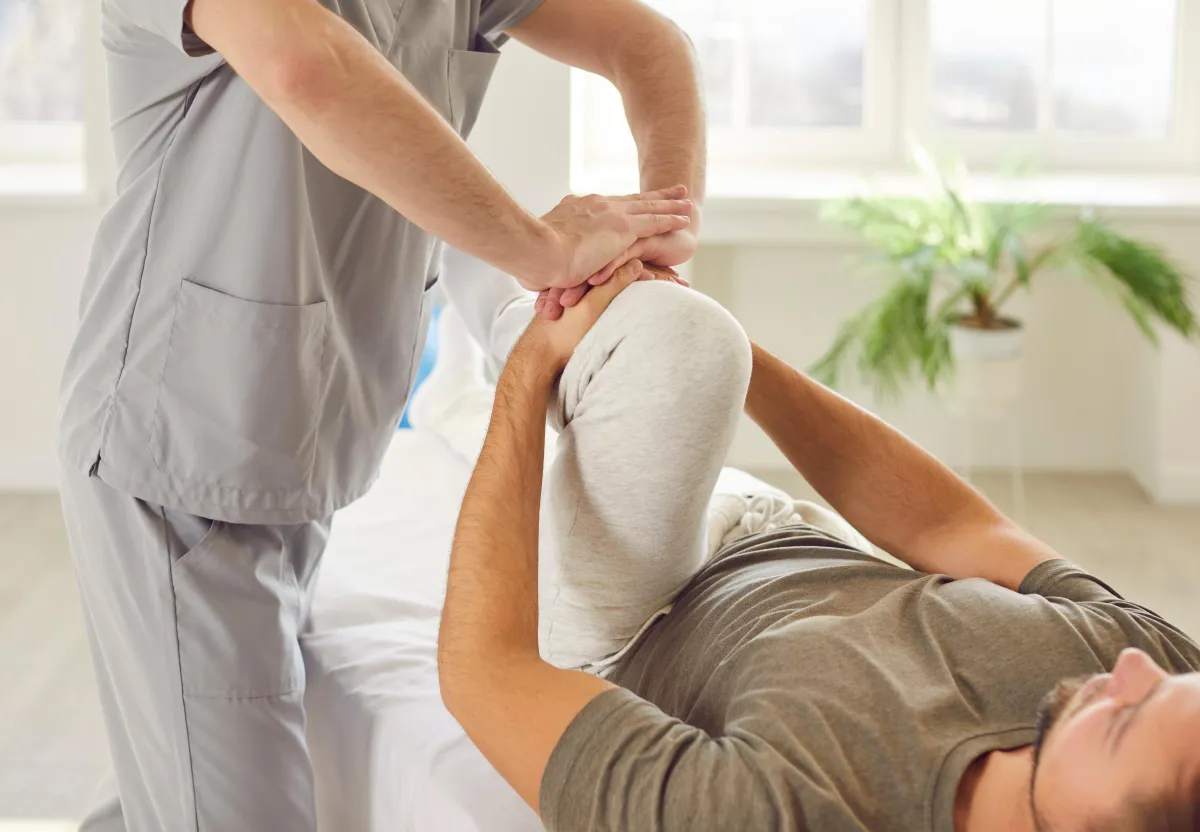Chronic Pain
Home » What We Treat » Chronic Pain
Easier Chronic Pain Control
Are you struggling with persistent pain that's restricting your movements? Our physical therapy can offer relief, even if previous treatments haven't worked.
Pain isn't straightforward and can last long after an injury or illness, taking a toll on both body and mind. If it stretches beyond three months, it's labeled as 'chronic pain.' At Stride Physical Therapy in Freehold, NJ, we know how tough this can be. Rest assured, we've helped many patients overcome chronic pain.
Understanding the Origins of My Chronic Pain:
Chronic pain usually comes from a problem with how your nerves work. Ongoing injuries, sickness, stress, and depression are all linked together, making your nerves constantly overreact. This can show up as pain in your back, joints, nerves, or cause headaches. The main reasons for this include:
Accidents
Accidents, be they in cars, at work, or home, can cause lasting pain. OSHA found in 2016 that for every 100 workers, about 3 get injured on the job. Plus, a study in the journal Pain shows that after a car crash, 21% suffer ongoing pain. This pain won’t just disappear, but a physical therapist in Freehold, NJ, can help reduce it.

Quick Links
FAQs
Overuse Injuries:
Overuse injuries are common from repetitive movements in daily activities. Incorrect posture, walking, working, or exercising can harm joints and muscles, leading to persistent pain. For instance, frequent heavy lifting at work without the right technique can cause ongoing back pain. Physical therapy teaches correct body movements to prevent such injuries.
Disease:
Chronic pain stems from conditions like arthritis, fibromyalgia, multiple sclerosis, shingles, and diabetic neuropathy. Physical therapy can help ease this pain.
Surgery:
Surgery can be essential but recovery is tough, often leading to added pain from how we move differently to avoid the discomfort. Physical therapy aids in faster, less painful recovery and helps prevent long-term pain by correcting these movements.
Chronic vs. Acute Pain: Know the Key Differences?
Acute pain is short-term pain that fades by itself within hours to weeks. For instance, the discomfort from a slight ankle twist typically eases away in a few days.
Chronic pain is a persistent pain that lasts 3-6 months or more. People have different reasons for feeling pain, and it's the top cause for visiting doctors. It can reduce your quality of life by affecting your movement, leading to reliance on medications, or causing mental health issues. Stride Physical Therapy can help you avoid these problems.
Can I find relief for my chronic pain?
Physical therapy primarily aims to alleviate pain by treating its source, rather than just covering up symptoms with drugs.
In Freehold, NJ, our skilled physical therapists can expertly assess and treat your movement issues. They'll check your body for weaknesses, limited mobility, and any walking or standing irregularities, pinpointing the root causes of your pain.
After assessing your condition, our physical therapist will devise a personalized treatment plan. You'll experience comforting hands-on therapy to enhance muscle and joint mobility, technologies to reduce pain, and specific exercises to boost your strength. The plan includes in-office sessions and a home routine to keep you fit and moving. Ready to say goodbye to chronic pain?
Get in touch with Stride Physical Therapy in Freehold, NJ, and schedule your visit now.
Health Blog

Arthritis Pain Relief Without Medication
Arthritis pain in your knees or hips might make you want to reach for opioid painkillers. These drugs can offer short-term relief, but they're addictive and won't fix the real problem. Try a safe alternative: physical therapy. Get in touch with Stride Physical Therapy to see how a physical therapist can help ease your arthritis pain.
What is Arthritis?
Arthritis causes joint pain, tenderness, and swelling. It's a myth that it only affects old people; it can strike at any age. Treatment at Stride Physical Therapy can help get your joints moving well again and increase flexibility.
Signs of Arthritis
Arthritis symptoms can be managed with physical therapy. Common symptoms include:
Swollen Tissues: Arthritis causes tissue swelling near the affected joint, often making the area warm to the touch.
Grinding Sensation: Loss of cartilage leads to a grinding feeling as bones move against each other.
Lost Mobility: Arthritic joints can restrict your range of motion, making daily tasks difficult.
Joint Stiffness and Aches: Joints are especially stiff upon waking and may be sensitive or painful to touch.
Pain: Pain during or after physical movement is common in arthritic joints.
The Dangers of Opioids
Opioid prescriptions and overdose deaths have surged fourfold in 20 years, resulting in addiction, fatal overdoses, withdrawal, and depression. According to the CDC, opioid sales jumped 300% since 1999 with daily prescription opioid deaths over 40 in 2011. Physical therapy provides a safer option.
Physical Therapy: A Safer Alternative
If you’ve been diagnosed with arthritis, physical therapy can help you manage your symptoms without painkillers. During your first appointment at Stride Physical Therapy, you’ll discuss your medical history and symptoms. Your physical therapist will assess your strength, balance, and range of motion to create an optimal treatment plan.
Treatment Approaches
Manual Therapy: Therapeutic massage helps loosen muscles, increase range of motion, and relieve stiffness and discomfort in arthritic joints.
Body Mechanics: Learn how to perform daily activities with minimal strain on your joints to prevent the grinding sensation and slow arthritis progression.
Additional Treatments
Posture: Learn methods to optimize joint function and minimize pain, and how to use muscles and joints efficiently to relieve pressure.
Education: If needed, your therapist will teach you how to use assistive devices like canes or walkers properly.
Exercise and Weight Management: Your treatment plan may include exercises to strengthen muscles, support weight, and relieve joint strain. Aquatic exercises in a pool may be recommended for joint relief.
Contact Us Today
Physical therapy can help you manage arthritis pain without powerful opioids or other painkillers. Call Stride Physical Therapy today to schedule your first appointment with a licensed physical therapist. Start your journey to pain-free living and improved mobility.


